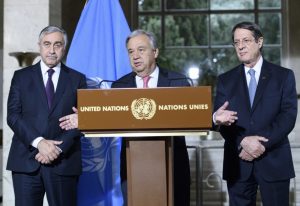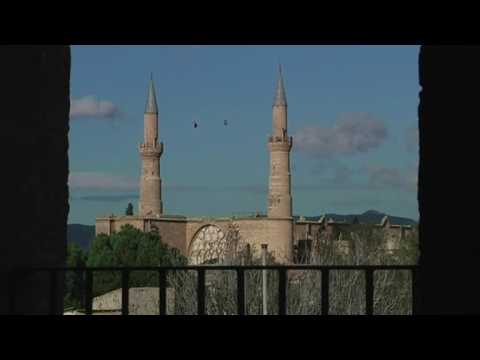 By Max Bearak
By Max Bearak
Unprecedentedly high hopes took hold at talks in Geneva earlier this week to end the 43-year partition of the Mediterranean island of Cyprus. But the prospect of reunification, long regarded as a Rubik’s cube of modern diplomacy, hit another impasse on Friday after Turkish President Recep Tayyip Erdogan rejected the prospect of Turkish soldiers ever leaving the island.
“We have told Cyprus and Greece clearly that they should not expect a solution without Turkey as guarantor,” Erdogan said. “We are going to be there forever.” The eventual withdrawal of Turkish troops is a key demand of Greek Cypriots.
Before Friday, there was hope that this would be the week the two side finally set terms for reunification. On Wednesday, in a first, the island’s two main communities — Greek-speakers in the south and Turkish-speakers in the north — exchanged maps of their hoped-for zones of control in the potential united, federal republic the talks seek to create. The lead negotiators and heads of the Greek and Turkish Cypriot people respectively, Nicos Anastasiades and Mustafa Akıncı, both grew up in the southern city of Limassol in the pre-partition years and have been hailed as coolheaded and committed.
The top diplomats of Greece, Turkey and the U.K., as well as the United Nations’ new secretary-general, António Guterres, arrived at the talks Thursday. Britain formerly ruled the island as a colony and maintains two military bases there. Talks ended on Friday, and the Guardian reported that they will resume on Jan. 18.

U.N. Secretary-General António Guterres, center, with Greek Cypriot President Nicos Anastasiades, right, and Turkish Cypriot leader Mustafa Akinci at a news conference on Cyprus on Jan. 12. (Laurent Gillieron/Pool Photo via AP)
Reunification talks have failed multiple times in the past. That long and contentious history leaves plenty of room for skepticism about this round. In 2004, an agreement was reached but voters in the south rejected it.
That said, optimism is running higher than ever before. Should an accord be reached, both groups would then hold twin referendums in April or May.
Cyprus is separated from Turkey by about 50 miles of sea and is considerably more distant from Greece. But Greek-speaking mostly Orthodox Christian people have historically been a majority on the island and now constitute around three-quarters of the population. Turkish Cypriots, mostly Muslim, make up about 18 percent.
The proportions were similar when Cyprus wrested independence from the British in 1960, but in those days the Turks lived interspersed among the Greeks, as they had during three centuries of Ottoman rule.
The independence struggle was mostly fought by Greek Cypriot guerrillas who wanted to join Greece. But the British insisted on separate nationhood to keep their military bases, and remained “guarantors” of the Cypriot state along with Greece and Turkey. Nevertheless, conflict between pro-union Greek Cypriots and Turkish Cypriots had spiraled out of control by 1963 and U.N. peacekeepers were deployed.

A Turkish army tank passes the Saray Hotel in the Turkish section of Nicosia, Cyprus, in July 1974. Negotiations on reunifying the small Mediterranean island nation of Cyprus are at a critical juncture, with top officials from Britain, Greece and Turkey joining the talks in Geneva on Jan. 12. (AP)
In 1974, Greek Cypriot militants attempted a coup, backed by Greece’s then-military government, which prompted Turkey to invade. The ensuing conflict displaced roughly 165,000 Greek Cypriots from the north and 40,000 Turkish Cypriots from the south. Turkey seized approximately 37 percent of the island’s land, and has kept tens of thousands of troops stationed in Cyprus ever since. The U.N. created a buffer zone between the north and south that stretches 180 miles.
The buffer zone’s northern and southern limits are “the lines where the belligerents stood following the cease-fire of 16 August 1974,” as recorded by the U.N. In some places it is miles wide, while in the divided capital city of Nicosia, it narrows at points to just a few yards. Some lanes are split right down the middle.
The land in between is frozen in 1974. Nicosia’s airport was abandoned as it fell in the buffer zone. The tarmac is littered with relics.
Elsewhere on the island, the buffer zone has become a refuge for wildlife. The village of Pyla, which is entirely within the buffer zone, is the only place on the island where Greek and Turkish Cypriots still live side by side.
Turkey has never formally recognized Cyprus nor its maritime borders. In 1983, the north declared its own independence, though Turkey is the only nation to recognize it.
After Wednesday’s trading of maps between Anastasiades and Akıncı, Turkish Cypriot spokesman Baris Burcu said that already agreed upon criteria were finalized and would hypothetically leave the Turkish Cypriot zone with between 28.2 and 29.2 percent of the island’s land. Akıncı’s strategy has been to bargain land in return for more power-sharing rights, including a possible rotating presidency.
The maps were put in locked vaults after the meeting due to the sensitivity of the border issue. Where the lines are officially drawn may end up dictating which refugees are able to return to their ancestral lands. Greek Cypriots have asked for land concessions from the north that would allow 90,000 refugees to return to their old homes. And each resettled Greek Cypriot refugee is one less Anastasiades will be asking for compensation for, taking money off the negotiating table and lowering the financial stakes for the Turkish side.
Despite its complexity, the border issue isn’t as contentious as negotiations around the removal of Turkish troops and the prevention of renewed ethnic violence.
Turkish Cypriots see Turkey’s troops continued presence as insurance against that possibility and have insisted on them remaining in past talks. Greek Cypriots on the other hand have argued that Turkey, which is not a member of the European Union, does not have the right to station troops in Cyprus, which is.
On Wednesday, Anastasiades reportedly floated the idea of an “international police force,” though he skimped on specifics, according to a diplomat who attended the session and spoke to the Associated Press on condition of anonymity because he wasn’t authorized to provide details about the talks.
“We are coming very close to what is the settlement,” U.N. Secretary-General António Guterres told reporters in Geneva on Thursday. “You cannot expect miracles of immediate solutions, we are not looking for a quick fix. We are looking for a solid, sustainable solution.”








